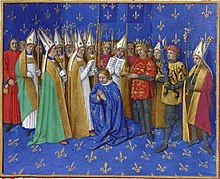Henry the Younger (England)
Henry the Younger ( February 28, 1155 , † June 11, 1183 ), also called the young King (English: the young King ; French: le jeune roi ), was a King of England from the House of Plantagenet . He was the second son of King Henry II († 1189) and his wife Eleanor of Aquitaine († 1204).
Life
When he was only a few months old, his father had the English barons swear on him and his older brother Wilhelm in Wallingford in April 1155 in order to secure their rights of succession in England. After Wilhelm's untimely death in 1156, Heinrich became his father's new main heir. He was raised by Thomas Becket until he was seven . In the course of a compromise between his father and King Ludwig VII of France , the young Heinrich took the feudal oath for Normandy in Gisors in October 1160 and was married to Princess Margaret the following November . In 1169, Heinrich received the holdings of the family around Normandy, Anjou and Maine on the mainland from his father , for which he had to pay homage again to King Ludwig VII.
On June 14, 1170, Henry was crowned King of England by Archbishop Roger of York in Westminster Abbey . The coronation was his father's show of force over the Archbishop of Canterbury , Thomas Becket, with whom Henry II found himself in a bitter dispute that culminated with the assassination of Becket in December of that year. Henry the Younger was crowned a second time on August 27, 1172 in Winchester Cathedral.
However, when he actually handed over power to his sons, Heinrich II showed extremely hesitant behavior, which prompted Heinrich, together with his brothers Richard (later Richard I the Lionheart) and Gottfried and their mother, to rebel against their father in 1173. They were supported by King Ludwig VII, who hoped that this would weaken the Plantagenets, Count Philip I of Flanders and King William I of Scotland . Henry and his father-in-law besieged Verneuil Castle in April 1173 , while the Count of Flanders was besieging Rouen . The revolt , however, was quickly put down by Henry II, who hired 20,000 Brabanzones and in August 1174 horrified Rouen until he reached the Poitou and took Saintes , where he imprisoned his wife Eleanor. After Richard had laid down their arms, Heinrich and Gottfried also surrendered and were reconciled with their father in Montlouis on September 30, 1174 .

Standing behind the kneeling Philip, the young Heinrich acts as the bearer of the crown.
( Jean Fouquet )
In November 1179 Heinrich took part in the coronation of Philip II of France in Reims and then took part with 500 knights in the tournament of Lagny-sur-Marne , which was organized by Count Heinrich I of Champagne and one of the with over 3000 knights involved greatest tournaments of the Middle Ages.
Heinrich's relationship with his father remained tense, as the younger one continued to demand a share in power. In order to accommodate his son, Henry II asked his younger sons Richard and Gottfried at Christmas 1182 in Caen to pay homage to their eldest brother for their respective possessions on the mainland. Both refused, which led to a war between the brothers. Heinrich allied with Gottfried and together they attacked Richard. Allegedly Gottfried was the driving force behind Heinrich, as he envied Richard for the rich Aquitaine . In Richard's favor, the father stepped in, which is why Heinrich now asked his brother-in-law King Philip II for help, who also sent him mercenaries.
In the midst of the fighting, Heinrich suddenly fell ill with dysentery in May 1183 , died in Martel Castle on the Dordogne, and was buried in the Cathedral of Rouen .
Heinrich was an extensive follower of court culture and was entirely in the chivalric spirit of his time. His tutor was the famous knight William Marshal , from whom he himself received the sword in 1173 and who assisted him until his death. Heinrich's death was lyrically mourned by Bertran de Born , among others . Since his brother Gottfried von der Bretagne also died before his father in 1186, Richard the Lionheart was to follow as the main heir. Henry's widow was born in 1186 with King Béla III. married from Hungary .
literature
- Lindsay Diggelmann: Marriage as Tactical Response: Henry II and the Royal Wedding of 1160. In: The English Historical Review , Vol. 119 (2004), pp. 954-964.
Web links
Remarks
- ↑ In contemporary documents the younger Heinrich was also called "Heinrich III." ( Henricus tertius ), but since he never became sole ruler, he is usually ignored in lists of kings in modern historiography. See: Gesta Regis Henrici Secundi Benedicti Abbas, Volume 1 , ed. by William Stubbs in Rolls Series (RS) 49 (1867), p. 301
| predecessor | Office | successor |
|---|---|---|
| Henry II |
King of England (together with his father) 1170–1183 |
Henry II |
| personal data | |
|---|---|
| SURNAME | Heinrich the Younger |
| BRIEF DESCRIPTION | Son of the King of England |
| DATE OF BIRTH | February 28, 1155 |
| DATE OF DEATH | June 11, 1183 |
